


 On Tahiti - Minerals Manufactures Home James Morrison On Tahiti - Persons
On Tahiti - Minerals Manufactures Home James Morrison On Tahiti - Persons
Revised May 29 2021
The Island of Taheite is devided into Seventeen Districts Calld Venooa (or Lands) with the name of the Head Chief of each annex'd. These are again divided into Chiefs Shares (or Patdoo) and these again into lesser Divisions calld Bahooe which are the Squires Shares and the Lord of the Mannor holds three Bahooe.
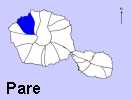
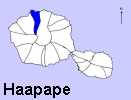
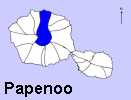
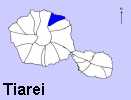
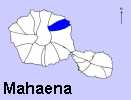
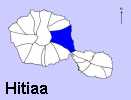
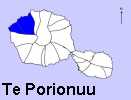
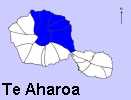
The Names of the Districts of Taheite Nooe are, 1st Oparre, 2nd Maatavye, 3rd Fwhapyeano, 4th Yunnowheea, 5th Teearey,1 6th Heedeea—These six are always in alliance and are Calld by the General Name of Tepirreonoo and Teeahhoroa and Extend from the Isthmus along the North side of the Island Westward to Tettaha...
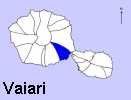
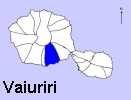

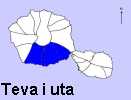
...7th Vyeerre, 8th Vyeooreede, 9th Paparra—these Three extend from the Isthmus Westward on the South Side to Attahooroo, and are known by the name of Tedevvaeuta— they are always in alliance with Tepirreonoo...
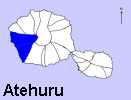
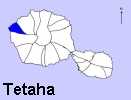
...l0th Attahooroo, 11th Tettaha—these two Districts lye on the West side of the Island and were ever rebelious to the reigning King till they were reduced in our time into Subjection.
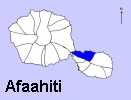
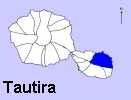
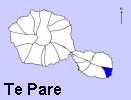
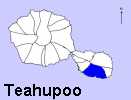
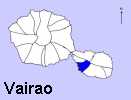
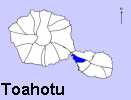
Taheite Eete Contains six Districts which are, 1st Affwhaheetdee, 2nd Towtirra (Calld by Captain Cook Oheitepeha), 3rd Teparre, 4th Vyeowtaya, 5th Matowwye, 6th Vyeooroo—the First beginning at the Isthmus on the North Side and the last ending at the Isthmus on the South Side—these Six were also rebellious and never suffered the Kings Flag to pass till our time—for a list of the Present Chiefs of Taheite See the Vocabulary2.
1[All the sources I have checked disagree with Morrison on the order of Tiarei, Mahaena (Yunnowheea, Teearey.) These districts still exist and are in the order I have shown.]
2[The Vocabulary was compiled by Peter Heywood, possibly with some input from Morrison. Morrison had intended to include it with his Journal when it was published, which it never was. The Vocabulary was used by the first English missionaries to Tahiti, but if it has survived, I have not been able to track it down.]
The Chiefs of Taheite are of two Houses, which are Tepirreonoo and Tedevvaeuta, each being absolute in their own dominions but only one can be Earee Nooe or king and the other lives in Friendship with him till Death or War disposesses Him of His Honors and title which then devolves on the other. They are supported by Voluntary Contributions and Free Gifts which however the People must not refuse to make if they have wherewithal to supply the Demand; if they have not it is not expected—The present Earee Nooi (or King) is the Son of Matte or O'Too, his name is Toonooeayeteatooa which may be thus translated, 'Too, the Great begotten of God', and his title Eatoa Raa or Sacred God—which Sacraligous Name and title He obtained by His Mother declaring that the Deity (Taane) Cohabited with her in her Sleep and, proving Pregnant soon after, the Child was declared to be the Offspring of the Deity and is rever'd as something supernatural —the only Male of The House of Tedevvaeuta is Tomaree Son of Pbooraya (Calld Oberea by Captain Cook) deceased, and Oammo, and Should both lines become extinct the Royal Marro becomes elective and evry Chief in the Society Isles becomes a Candidate. The Chiefs are Numerous and evry district has two or three besides others who reside as private Gentlemen on their own estates, while out of Employ being still regarded as Chiefs tho residing as a Squire under another and when they are Calld into Office they leave their estates to the Care of their Friends who have no rent to pay except supplying such demands as are made by the Chiefs in Common as if the land belongd to any other person.
Before I proceed any farther it may be requisite to the better explanation of their Manners & Customs, to discribe the Different Classes into which they are Devided which are Four viz 1st Earee rahi or Nooe or King, 2nd Earee, Chief of a District, which are Greater or less according to their Posessions, and Towha which answers to Lord of the Mannor, 3rd Ratirra—Esquire, & 4th Mannahowne or Mattaeyna—Tennants; amongst each of these classes are Some Raa or Sacred and some Noa, Unhalloed or Common; servants are Calld Tewtew in General but those who wait on Weomen are Calld Tewty by way of derision—tho it is not uncommon to find Young Men of the first Familys and the Younger Brothers of Chiefs in the Service of the Fair Sex but by debasing themselves thus, they are rendered Incapable of assisting at any religeous Ceremony.
The Chiefs have each Personal estates and when in Office have either a District or Part of One Calld a Patdoo which maintains them by Contributions—'under them are The Towha & Ratirra each holding his land independant of the Other, any Ratirra can put a Raahooe on his own division (which is so named from their power to prohibit the expenditure of any species of Provisions on his own land)—the Chief on His Patdoo and the King on the Whole, or any Number of Districts, but if the Chiefs should not act up to the Dignity of their Office they may be devested of their Office, but they are still Chiefs, and tho the King may be stripd of his Government he still retains his royalty and none but one of the Two Familys can ever enjoy that Dignity while they are in being—so that it is no more then a Change in the Ministry, with the other Chiefs it is the same and they often Change stations. When a king is invested with the Marro Oora or red sash of Royalty, he sends two Flags round the Island by different routs and those who acknowledge his Supremacy pass them with Ceremony, and attend his Corronation with evry Cheif a Human Sacrafice, but if they refuse to acknowledge him they Break the Staff and trample on the Flag as soon as it enters their Territory; upon which war is declared against them and if they cannot reduce them by War they enjoy their Independence, but the King is King still—While these Flags are passing no fire is made near the Beach; nor must any Canoe be launchd for any Purpose; the bearers of the Flag Passing Close to the surf the whole way any breach of this would be punnishd with Death and forfeiture of Estate, the Beach being made Sacred by the Royal Flags, it would be a Crime of the Highest Nature to launch a Canoe over it or make a Smoke nearer then 2 or 3 miles of it.
When a Chief is present in any Company the Men strip their Bodys to the Waist not suffering any Covering on their Head or Shoulders in His Presence—and all the Weomen present uncover their Shoulders tucking their Cloth under their armpits, to Cover their Breasts in token of obedience and respect, to his presence; the Men are not always particular in this point except Upon the Chiefs Heredetary land or that of His adopted friend, where any neglect would be deemd an Insult and punishd accordingly—but in presence of the King the Chiefs themselves must strip—Nor do they stop to see him first if they Have Notice of His approach either by land or in a Canoe, Nor must any person pass his land by walking over it or Sailing by it without paying the Compliment. If a Chief takes a liking to any thing in the Posession of any Person and they don't like to part with it immediately, he then Curses it, or Calls it by his own name or any of his relations and it is sanctified so far that the Owner cannot again make use of it upon Pain of Death or Forfeiture of their land tho they may keep it if they will, which however is seldom the Case—nor Is the Chief often obliged to make use of this alternative, as they make it their Study to anticipate the Wishes of their Chiefs, and leave them nothing to ask for, giving them whatever he seems inclined to have and when the Chiefs do ask for any thing it is Given freely at the first word.
If a Chief should enter or even toutch the House of any Female of a lower Class, it is rendered sacred by his presence and She Can never eat in it any more (but any man may) and she must provide herself with a new house and new furniture—for this reason if the Chief should be caught in the rain, he must not take shelter till he comes to a mans house, or one of His own (of which He has several for that and such like purposes) tho He should be a mile from one, and for this reason also No woman except of equal rank, can eat on board a Ship after the Chief has been on board, under pain of severe punishment, which accounts for the Women Calling the provisions on board Maa Raa (Sacred food) every thing on board being made sacred by his presence, yet nevertheless when they were right Hungry would eat in private, tho even then they will hardly ever eat in company with other Weomen except they are well acquainted.
The Chiefs are in General taller, stouter and of a different appearance from the Common People and their Weomen are also larger and fairer then the lower Classes. They have in General a more serious and thoughtful turn and are more accomplishd, they are always superior to them at all things either Labour or diversion, and the Earee weomen are by far the Best Clothmakers; in labour they are always first, it being no disgrace to know how, but a great one not to know how—and they always bear a part in the Cooking Provisions for their Guests—they are Company for their meanest Subject or Servants who nevertheless pay them due reverence & respect and their poverty never renders them despicable, as they never loose their rank nor can any who are not born a Chief ever arrive at that Dignity, and tho when a Child is born the ti[t]les & honors of the Father immediately fall to it, yet the Father is still a Chief, and is always regarded as such, tho out of Office by the birth of a Child to which he is sometimes a Guardian or Regent. Their only pride is Cleanlyness and Generosity for which they are remarkable, and I may say they have no equals in these points—Their retinue Costs them nothing as they pay their attendants no wages, and Change them often, no man staying in their service longer then he pleases, tho they have some who stay their whole lives in the service of the same family—and these old servants are always considered as one of the Family and by them the Household is Managed and they, like other Courtiers, have as much to do in the Government as their Masters.
Few of the Chiefs are shorter then Six feet, but many of them exceed that height by some inches, for this reason they readily beleived Captain Cook and such of His Officer as were tall stout men were Chiefs, but they have no Conception that a short man can be a Chief.
If any Person speaks disrespectfully of a Chief he is sure to suffer death, and should one Chief speak ill of another it would instantly bring on a War and this has been the occasion of several bloody battles and is at present the subject of the annimosity between Tyarrabboo and Taheite Nooe, the late Chief of Tyarrabboo having refused to acknowledge Toonooeayeteatooa who he said was not the son of the Deity nor of o'Too but of a Favourite Minion and that his Mother had only raised that Story out of Her own head that her Son might not be disinherited if he did not attain his proper size.
 On Tahiti - Minerals Manufactures Home James Morrison On Tahiti - Persons
On Tahiti - Minerals Manufactures Home James Morrison On Tahiti - Persons